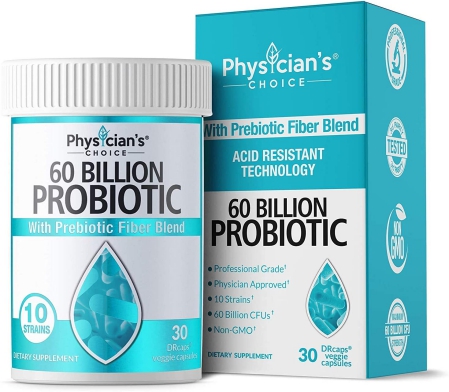Probiotic 60 Billion CFU is one of the most significant supplements of great health importance. In recent days it is extensively used by a wide group of people. This supplement is mainly composed of probiotic (Acidophilus) and organic prebiotics. The maximum strength of this supplement is 60 billion CFU. CFU stands for Colony Forming Unit, which is defined as the total number of active or living microorganism present in each serving. Here, this supplement provides 60 billion CFU per serving.
What is probiotic?
Probiotic are defined as living microorganism, which are beneficial for health, especially for the digestive system. Foods that contain living microorganism are generally called probiotics. Especially the fermented food contains probiotic, which include yogurt, miso, pickle, tempeh, cheese, sour dough bread, kefir, sauerkraut all of these are the natural source of probiotics. In Now, several probiotic supplements become available that contains various strain of living microorganism within it and they are widely used.
Mainly the genus Lactobacillus or Saccharomyces boulardii, or Bifidobacterium are the most common researched probiotics that are used in supplementation. Current time supplementation of probiotic occurred in well-developed scientific way.
Several researches have shown that it is beneficial to consume those probiotic products, which contain 1 billion colony forming unit minimum. Consumption of probiotic is associated with enhancing and restoring the gut flora and improves the entire health of gastrointestinal tract. Apart from digestive system, probiotics are found to be beneficial for immune function, heart, mental health and weight reduction.

What is prebiotic?
Prebiotics are the substances present in food, which is associated with enhancing the growth of beneficial microorganism within the body, such as beneficial intestinal flora. Prebiotics can alter the composition of microorganism within the gastrointestinal tract. Basically, prebiotics are nondigestible soluble fibre portion, which are consumed. This portion is passing through the upper portion of gastrointestinal tract, especially through colon, leading to stimulate the peristalsis (colonic movement). Improve in peristalsis is coupled with reducing the risk of colon cancer. Studies has shown that when it passes through the gastrointestinal tract it passes in undigested form and help in the colonization of intestinal beneficial bacteria in the large bowl as, it acts as substrate for them. This probiotics are used by all beneficial microorganism of gut as fuel and it has shown that the microorganism are utilized the probiotic for their growth and development, as well as produce some substances in turn, that are found to acidify the colon. This help to serve a good nutrition to the cells of the colon and make the colon healthy.
Differences between probiotic and prebiotic
The main differences of probiotic and prebiotic are briefly shown in the following table-
| Probiotic | Prebiotic |
| It is the living microorganism present in foods or supplements | It is substance of food which acts as fuel for intestinal bacteria and promoting their health |
| It can be hydrolyzed and digested by gut | It cannot be digested by gut |
| It is susceptible to heat, acid and cold and can be killed by them | It can live on in heat, acid and cold |
| It shows health benefits to those individuals who consume it | It provides health benefit to the intestinal microorganism present within the gut |
| The foods which are rich in probiotics are – yogurt, soft cheese, sour dough bread, fermented food stuffs, sauerkraut | The foods that contain prebiotic include – asparagus, banana, legumes, and oatmeal. |
| In most cases, it has shown that the probiotics are all utilized in small intestine and in stomach | On a contrary, most of the prebiotics are used up by in gut |
What exactly the Probiotics 60 Billion CFU is?
It is an important probiotic supplement, specially used by adult male and female and it is mainly composed of probiotic and organic prebiotic. In this supplement 10 important microbial strains are used scientifically to produce it, which include, Lactobacillus acidophilus, Lactobacillus paracasei, Lactobacillus salivarius, Lactobacillus casei, Lactobacillus plantarum, Bifidobacterium bifidum, Bifidobacterium longum, Lactobacillus bulgaricus, Bifidobacterium breve and Bifidobacterium lactis. These supplements have the strength of 60 billion colony forming unit, which is obtained per serving. These supplements play several important roles in maintaining good health and help to reduce the susceptibility of developing various degenerative diseases. Various researches has exposed that these supplements has a great importance of restoring and improving the health of digestive system, it is associated with treating and preventing diarrhea and constipation, help to prevent the risk of cancer specially colon cancer, help to improve mental health, enhances cardiac health and plays significant role in preventing eczema and allergies.
Nutritional significance of Probiotics 60 Billion CFU
Role on gastrointestinal tract
- Studies has exposed that these supplements are essential for improving the health of digestive system
- It is made up of probiotics and organic prebiotics, among them, the probiotics are responsible for enhancing the growth of intestinal beneficial bacteria and probiotics are responsible for improving the digestive capacity
- It helps to reduce the incidence of flatulence, bloating, diarrhea, constipation.
- It helps to make the stool bulky and help to retain water within stool that is related to increase the colonic movement (peristalsis), leading to easy defecation
- Proper colonic motility is associated with reducing the risk of developing colonic polyp, colon cancer, irritable bowel syndrome, inflammatory bowel syndrome
- It is seen that prolong consumption of antibiotic causes destruction of intestinal bacteria hence it causes digestive difficulty leading to diarrhea. Consumption of these supplements can be able to reduce the incidence of diarrhea

Role on mental health
- Recent studies have uncovered that consumption of these supplements for more than one to two months can improve some mental conditions like, depression, anxiety, obsessive compulsive disorder
- It helps to improve memory
Role on cardiac system
- These supplements are rich in fibre and hence its consumption is associated with reducing cholesterol level
- These supplements contain living microorganism that help to reduce cholesterol by splitting bile and reduces the level of total cholesterol in the blood.
- Its consumption is related to reduce the risk of heart attack due to lowering of bold cholesterol level and reduce blood pressure
Role on immune system
- It helps to boosting up the immune system
- It is responsible for preventing the growth of harmful microorganism within the body
- Several researches have shown that consumption of this supplement is coupled with increasing the synthesis of immunoglobulin, killer cell and lymphocyte, which is related to enhancing the resistant power of the body and inhibits the susceptibility of infectious diseases.
- Consumption of these supplements are responsible for inhibiting several infections, especially respiratory infections and allergies

Others health benefits
- These help to inhibit the intestinal absorption of digested fat and help the fat to be excreted through stool, resulting in less fat deposition within the body.
- It helps to enhance the BMR (Basal Metabolic Rate) and hence help in weight reduction, especially enhance the reduction of belly fat
- It is associated with stimulating hormone action and makes them properly functioning, thus reduces the risk of several hormonal disorders
Consumption of these supplements with recommended dosage (1 to 100 billion CFU per day) play significant role to enhance the overall health status of individual.
Source:
Ambalam, P., Raman, M., Purama, R.K. and Doble, M., 2016. Probiotics, prebiotics and colorectal cancer prevention. Best practice & research Clinical gastroenterology, 30(1), pp.119-131.
Islam, S.U., 2016. Clinical uses of probiotics. Medicine, 95(5).
Kerry, R.G., Patra, J.K., Gouda, S., Park, Y., Shin, H.S. and Das, G., 2018. Benefaction of probiotics for human health: A review. Journal of food and drug analysis, 26(3), pp.927-939.
Markowiak, P. and Śliżewska, K., 2017. Effects of probiotics, prebiotics, and synbiotics on human health. Nutrients, 9(9), p.1021.
Quigley, E.M., 2019. Prebiotics and probiotics in digestive health. Clinical Gastroenterology and Hepatology, 17(2), pp.333-344.
Sánchez, B., Delgado, S., Blanco‐Míguez, A., Lourenço, A., Gueimonde, M. and Margolles, A., 2017. Probiotics, gut microbiota, and their influence on host health and disease. Molecular nutrition & food research, 61(1), p.1600240.
Szajewska, H., Canani, R.B., Guarino, A., Hojsak, I., Indrio, F., Kolacek, S., Shamir, R., Vandenplas, Y., van Goudoever, J.B. and Weizman, Z., 2016. Probiotics for the prevention of antibiotic-associated diarrhea in children. Journal of Pediatric Gastroenterology and Nutrition, 62(3), pp.495-506.



